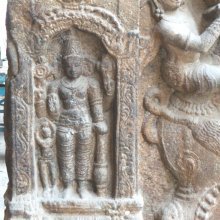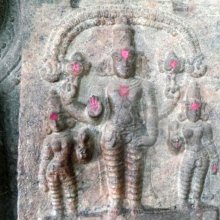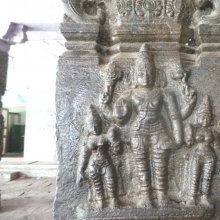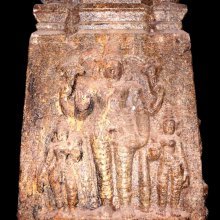Shridevi, Śrīdevī, Shri-devi: 7 definitions
Introduction:
Shridevi means something in Hinduism, Sanskrit, Jainism, Prakrit, the history of ancient India. If you want to know the exact meaning, history, etymology or English translation of this term then check out the descriptions on this page. Add your comment or reference to a book if you want to contribute to this summary article.
The Sanskrit term Śrīdevī can be transliterated into English as Sridevi or Shridevi, using the IAST transliteration scheme (?).
Images (photo gallery)
(+9 more images available)
In Hinduism
Purana and Itihasa (epic history)
Source: Cologne Digital Sanskrit Dictionaries: The Purana Index1a) Srīdevī (स्रीदेवी).—A daughter of Devaka and one of the seven wives of Vasudeva.*
- * Matsya-purāṇa 44. 73.
1b) Born of milk ocean; image of: in the form of a girl of nine years, youthful, with round neck, red lips and charming brows and holding the lotus Śrīphalam in her hands.*
- * Matsya-purāṇa 250. 3; 261. 40.

The Purana (पुराण, purāṇas) refers to Sanskrit literature preserving ancient India’s vast cultural history, including historical legends, religious ceremonies, various arts and sciences. The eighteen mahapuranas total over 400,000 shlokas (metrical couplets) and date to at least several centuries BCE.
Shaivism (Shaiva philosophy)
Source: Shodhganga: Iconographical representations of ŚivaŚrīdevī (श्रीदेवी) is the name of a deity who was imparted with the knowledge of the Pārameśvarāgama by Sadāśiva through parasambandha, according to the pratisaṃhitā theory of Āgama origin and relationship (sambandha). The pārameśvara-āgama, being part of the eighteen Rudrabhedāgamas, refers to one of the twenty-eight Siddhāntāgama: a classification of the Śaiva division of Śaivāgamas. The Śaivāgamas represent the wisdom that has come down from lord Śiva, received by Pārvatī and accepted by Viṣṇu.
Śrīdevī in turn transmitted the Pārameśvarāgama (through mahānsambandha) to Uśana who then, through divya-sambandha, transmitted it to the Devas who, through divyādivya-sambandha, transmitted it to the Ṛṣis who finally, through adivya-sambandha, revealed the Pārameśvarāgama to human beings (Manuṣya). (also see Anantaśambhu’s commentary on the Siddhāntasārāvali of Trilocanaśivācārya)

Shaiva (शैव, śaiva) or Shaivism (śaivism) represents a tradition of Hinduism worshiping Shiva as the supreme being. Closely related to Shaktism, Shaiva literature includes a range of scriptures, including Tantras, while the root of this tradition may be traced back to the ancient Vedas.
Shaktism (Shakta philosophy)
Source: Google Books: Manthanabhairavatantram1) Śrīdevī (श्रीदेवी) refers to one of the eight Yoginīs (yoginyaṣṭaka) associated with Oṃkārapīṭha (also called Oḍḍiyāna, Ādipīṭha or Uḍapīṭha), according to the Manthānabhairavatantra, a vast sprawling work that belongs to a corpus of Tantric texts concerned with the worship of the goddess Kubjikā.—[...] The eight Yoginīs (yoginyaṣṭaka): Jayā, Vijayā, Jayantī, Aparājitā, Nandā, Bhadrā, Bhīmā and Śrīdevī
2) Śrīdevī (श्रीदेवी) or Vakrikā is the name of the Mother (Avvā) associated with Pūrṇagiri, one the eight Sacred Seats (pīṭha), according to the Yogakhaṇḍa (chapter 14) of the Manthānabhairavatantra.

Shakta (शाक्त, śākta) or Shaktism (śāktism) represents a tradition of Hinduism where the Goddess (Devi) is revered and worshipped. Shakta literature includes a range of scriptures, including various Agamas and Tantras, although its roots may be traced back to the Vedas.
In Jainism
General definition (in Jainism)
Source: Google Books: Jaina IconographyŚrīdevī (श्रीदेवी).—One of the four types of Veśmadevas;—Worship of Śrīdevī protects the life of a child in the mother’s womb.
Source: archive.org: The Jaina IconographyŚrīdevī (श्रीदेवी) or Śrīkāntā is the father of Kunthanātha: the seventeenth of twenty-four Tīrthaṃkaras or Jinas, commonly depicted in Jaina iconography.—Kunthanātha’s parent’s names, as may be gathered from the Jaina Purāṇas, are variously called Śūrasena, Sūrya, Śivarāja (Śvetāmbara version) for the father, Śrīkāntā or Śrīdevī for the mother. His father belonged to the Kuru race, and Hastināpura as his capital, where the Jina was born. He, like his predecessor, became an emperor.

Jainism is an Indian religion of Dharma whose doctrine revolves around harmlessness (ahimsa) towards every living being. The two major branches (Digambara and Svetambara) of Jainism stimulate self-control (or, shramana, ‘self-reliance’) and spiritual development through a path of peace for the soul to progess to the ultimate goal.
India history and geography
Source: Heidelberg: Glory of the Tiruvanantapuram Padmanabhasvami TempleŚrīdevī (श्रीदेवी) refers to one of the consorts of Lord Padmanābha, according to the Anantaśayanakṣetramāhātmya, a text talking about the Thiruvananthapuram temple in eleven chapters, written before the 14th century and claiming to be part of the Brahmāṇḍapurāṇa.—The māhātmya provides us with a beautiful description of the form in which the Lord [Padmanābha] manifested himself at the request of the sage. In the description, the māhātmya also mentions Śrīdevī and Bhūdevī, the consorts of Lord Padmanābha.

The history of India traces the identification of countries, villages, towns and other regions of India, as well as mythology, zoology, royal dynasties, rulers, tribes, local festivities and traditions and regional languages. Ancient India enjoyed religious freedom and encourages the path of Dharma, a concept common to Buddhism, Hinduism, and Jainism.
Languages of India and abroad
Kannada-English dictionary
Source: Alar: Kannada-English corpusŚrīdēvi (ಶ್ರೀದೇವಿ):—
1) [noun] = ಶ್ರೀದಯಿತೆ [shridayite].
2) [noun] the family goddess (of a person).
Kannada is a Dravidian language (as opposed to the Indo-European language family) mainly spoken in the southwestern region of India.
See also (Relevant definitions)
Partial matches: Shri, Devi, Tevi.
Starts with: Shridevisimhadeva, Shritevi.
Ends with: Shritevi.
Full-text (+141): Chvaskamini, Kamakshi, Shrikanta, Tripura Rahasya, Citevi, Pundarikaksha, Amritalakshmi, Bhadrakali, Artham, Ceyyon, Navay, Dashapushpa, Asanamurti, Lakshmi, Dharmapala, Nanda, Ushana, Jada, Udasina, Kilita.
Relevant text
Search found 30 books and stories containing Shridevi, Śrīdevī, Shri-devi, Sri-devi, Śrī-devī, Sridevi, Śrīdēvi, Śrī-dēvi; (plurals include: Shridevis, Śrīdevīs, devis, devīs, Sridevis, Śrīdēvis, dēvis). You can also click to the full overview containing English textual excerpts. Below are direct links for the most relevant articles:
Animal Kingdom (Tiryak) in Epics (by Saranya P.S)
Sanskrit sources of Kerala history (by Suma Parappattoli)
6.6. Other Prasastis < [Chapter 2 - Historical details from Mahatmyas and Prashastis]
Middle Chola Temples (by S. R. Balasubrahmanyam)
Temples in Seramadevi < [Chapter II - Temples of Rajaraja I’s Time]
Temples in Mannarkoyil < [Chapter IV - Temples of Rajendra I’s Time]
Temples in Attur < [Chapter II - Temples of Rajaraja I’s Time]
Lalitopakhyana (Lalita Mahatmya) (by G.V. Tagare)
Chapter 41 - Propitiation of Goddess Kāmākṣī
Chapter 33 - Seven Chambers beginning with Topaz
Diaspora of Bhuta (Daiva) worshipping cult—India and Indonesia (by Shilpa V. Sonawane)
Part 6.6 - Dewi Siri (Indonesia) < [Chapter 4 - Inter-Disciplinary Analysis]
Part 10 - Dewi Sri: Indonesia < [Chapter 1 - Introduction]
Related products






